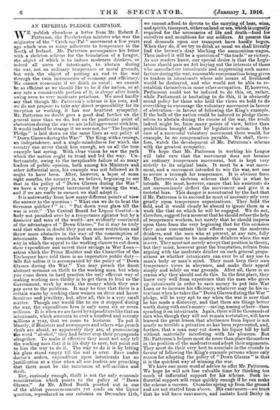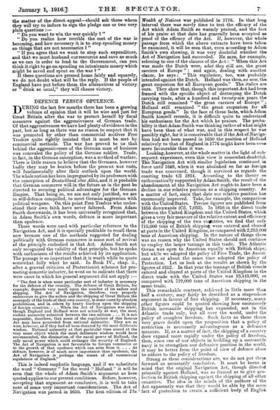AN IMPERIAL PLEDGE CAMPAIGN.
-.publish elsewhere a letter irom'Mr. Robert J. _Patterson, the Presbyterian minister who was the originator of 'the " Catch-my-Pal " movement a 'few years ego whieh 'won se many adherents to temperance in the North of Ireland. Mr. Patterson accompanies his letter with a skeleton scheme for the foundation of a 'League, the object of which is to induce moderate drinkers, or indeed all -users- of intoxicants, to abstain during the war, not on ordinary temperance or moral grounds, but with the object of putting an 'end to the war threugh the. twin instruments-of economy and efficiency. We cannot economize if we drink as usual ; we cannot he as efficient as we should like -to be if the nation, or at any rate a considerable portion of it, is sleepy after lunch I owing even to very moderate potations. We need-hardly! say that 'though Mr. Patterson's scheme is his own; and • we do not propose to take any direct responsibility for its inception or working, it has our heartiest sympathy. -Mr. Patterson no doubt goes a good deal further on the general issue than we do, but on the particular point of abstention during the war we are in full agreement with him. It would indeed-be strange if we were not, for ":The Imperial 'Pledge" is laid -down on the same lines as our policy of Down Glasses during the War." The King, with a courage, • an independence, _and a single-mindedness for which the • country can never thank him enough, set -us all the true example last spring. With clear vision he saw the path -which the -nation ought to tread and led the way. Un-; fortunately, owing to the inexplicable failure of .so many -readers of public opinion, both among his Ministers and ether influential men, his example was not followed as It ought to have 'been. After, however; a -lapse of some eight months, the country is, we believe, :beginning to see that in the policy of "Down -Glasses during the War " we 'have a very potent instrument for winning the war, and if we are, really in earnest we shall adopt it. It is noteworthy from how many different 'points of view the-answer to the question : " What can we do to beat the Germans quicker I " is : "Put down your glees 'till the war is over." 'The Central 'Board for Liquor Control—a body not presided over by a temperance agitator-but' by a financier and man of the world—are evidently 'convinced. of the advantages of " Down Glasses," for it may be truly said that when in doubt they put on more restrictions and throw more obstacles in the way .of 'the -consumption of intoxicants. More remarkable :than all, 'however, is the- way.in which thoappeal to the working classes- to cut down. .their expenditure and invest their savings in 'Wet Loan--• action which the Prime Minister 'and the Chancellor of the, Exchequer'have told them is an imperative public duty-- fells flat unless it isaccompanied by •the policy of " Down 'Glasses during -the 'War.' You may -preach the -finest' abstract sermons 'on thrift to the working man, but when . you come down to hard practice the only efficient way Of making working men thrifty is to get them to lend to the Government, week by week, the money which they now, pay over to the publican. It may .be true that there is a certain waste by working-class women on.dress and house furniture and jewellery, but, after all, this is a very small matter. Though one 'would like to see it stopped during': the war, the expenditure here is only some six or seven, ' It is when we are faced by expenditure like that on . intoxicants, which amounts to .over a hundred and seventy millions a year,' that we come to business. To put it bluntly, if Ministers and newspapers and others ,who preach _thrift .are afraid, as apparently they are, of pronouncing 'the word "alcohol," they had better stop their propaganda altogether. To make it effective they must not only tell the working man that it is his duty to save, but point out to him the way to do it. The way to do it is by 'letting his glass stand empty till the war is over. Save under etloctor's - orders, expenditure upon intoxicants has no , justification at a time when all our leaders are preaching that there must be the maximum of self-sacrifice and thrift.
Bat,- curiously enough, thrift is not the only economic oonsideration which points to the policy of 'Down Glasses." As Mr. Alfred Booth pointed out in one of the ablest pronouncements yet made on the liquor question, reproduced. in our columns on December 11th, we cannot afford to devote to the, carrying of beer, wine; and spirits,transport, either on land or sea, which is urgently required for the necessaries of life and deathL-food for ourselves and munitions -for our soldiers. At present the real demands upon our transport have hardly begun. When they do, if we try to drink as usual we shall literally find the brewer's -dray blocking the ammunition-wagon. Then indeed it will be a question of "-the trade" or victory. As our readers 'know, our special-desire is that the Legis- lature should pass an Act buying out the interests of those who manufacture intoxicants and suppressing such manu- facture during the war, •reasonable compensation being given to traders in intoxicants whose Sole means of liveldieod would be destroyed, and who would not be able to re- establish themselves in some other occupation. If, however, Parliament could not be induced to do this, or, rather, .while Parliament. is hesitating to do this, it is obviously sound policy for ,those who hold 'the views we 'hold to do everything to encourage the voluntary movement-ia favour of abstention—in fa.vour of following the King's example. If the bulk ef the nation could be induced to -pledge them- selves to abstain during the course of the war, the result indeed might be, from .many points of view, better than prohibition brought about by legislative action. In the case of a successful voluntary movement there would, for example, 'be no compensation payable. We shall, there- fore, watch the development of ,Mr. Patterson's scheme with the greatest sympathy. We hope that Mr. Patterson in working: his League will take care that the movement does not become an ordinary temperance movement, but is kept very strictly -to its original basis. It must be a war move- ment, and a movement intended -to win the war, not one to secure a triumph for temperance. It is • obvious from Mr. Patterson's skeleton scheme that this is what he intends. He must, however, ensure that his assistants do net unconsciously deflect the movement and give it a teetotal bias. 'This daegexis accentuated by the fact that if Mr.-Patterson is to succeed he must of necessity rely very greatly upon temperance organizations. They lecild tbe field, and it would clearly be absurd to ignore them -in a work like that on which 'he will be engaged. We do not, therefore, suggest fora moment thet he should refuse the help of temperance workers, but merely that he -should impress upon them from the very beginning that for this occasion they must concentrate their 'effortsupon the moderate drinkers, and the men who at present, at any rate, fully intend to continue -to be moderate drinkers when the war is over. They must not merely accept that position in theory, but they must, however great the temptation, refrain from arguing with the-moderate drinker on such general propo- sitions as whether intoxicants can ever be of any use to man's body or man's mind. They must keep their own temperance views in abeyance, and make their appeal simply -and-solely on war grounds. After all, there is no reason why they should not do this. In the first place, they 'know very well from experience that the man who gives up intoxicants in order to save money to put into War Loan or to increase his efficiency,-whatever may be-his in- tentions when he takes the " Down Glasseeduring theWar " yledge, will be very apt to say when the war is over that he has made a discovery, and that there are things better worth doing with one's money—saving, among others—than spending it on intoxicants. Again, there willbe thousands of men who, though they will not remain teetotalers, will have learned the great lesson that abstinence from liquor is not nearly so terrible a privation as has been represented, and, further, that a man may cut down his liquor bill by half without materially interfering -with his pleasure. 'But Mr. Patterson's helpers must do more than place themselves in the position of the moderates and adopt their arguments. They must do their very 'best to associate in the crux de in favour of following the King's example, persons whose only reason for adopting the policy of " Down•Glasses " is that it is the quickest way of winning-the war. We have one more word of advice to offer Mr. Patterson. 'We hope he will not lose valuable time by thinking too much of 'influential support for his Scheme. Such in- fluential support will come quickly enough -if he can make the scheme a success. Crusades spring up from the ground and are not started from above. His canvassers--we trust; that he will have canvassers, and imitate Lord'Derby in the matter of the direct appeal—should ask those whom they will try to induce to sign the pledge one or two very plain questions " Do you want to win, the war quickly I " " Do you, realize how terrible the cost of the war is becoming, and how necessary it is to stop spending money on things that are not necessaries I " If you agree that we want to stop such expenditure, and that we must husband our resources and save as much. as we can in order to lend to the Government, can your thinkit right to go on: spending on intoxicants money which might be saved and spent on the war ? " If these: questions are pressed home fairly and squarely, we do not doubt what will be the reply. If the people of England have put before them. the alternatives of victory. or " drink as usual," they will choose victory.











































 Previous page
Previous page